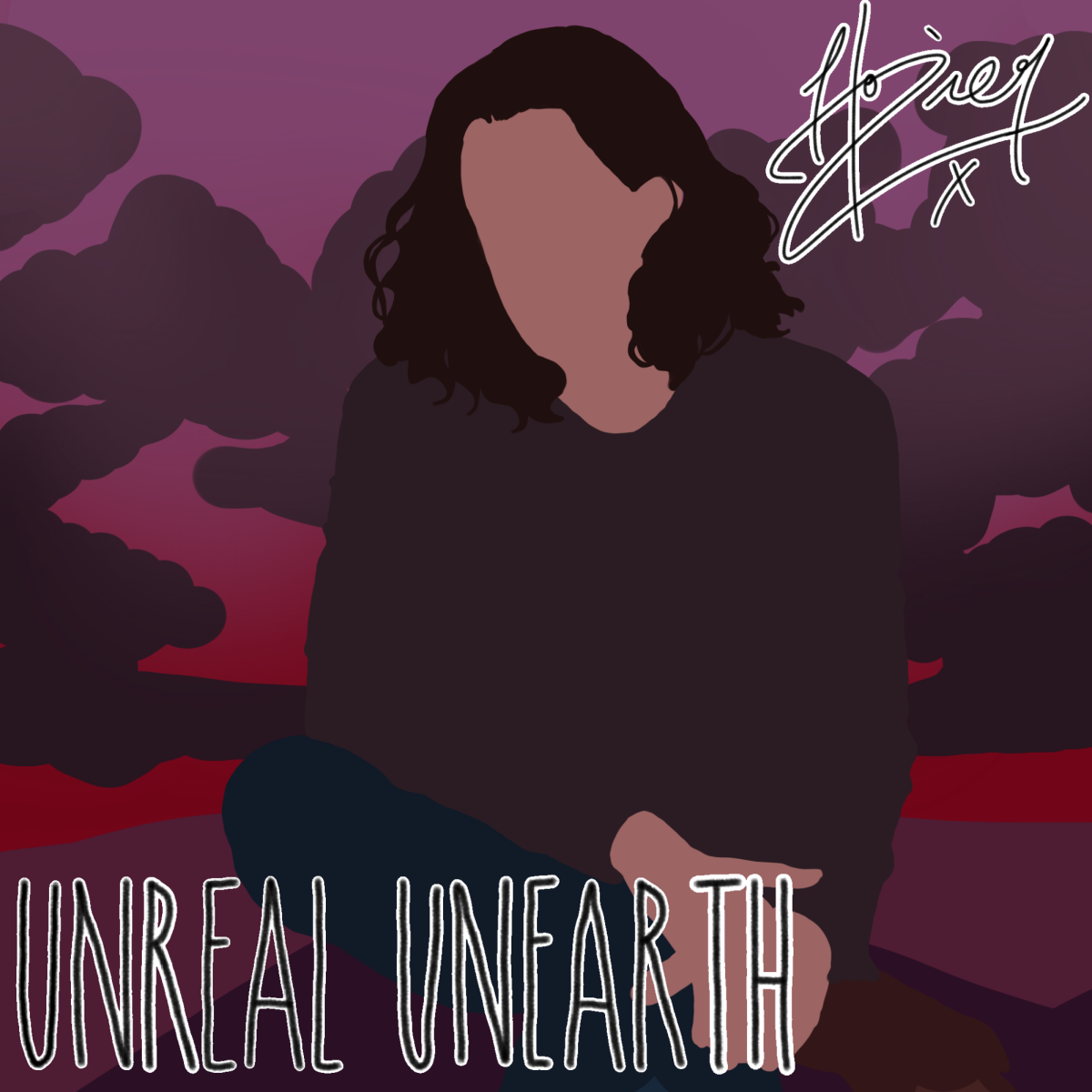It’s already well established that Irish singer-songwriter Hozier is a master of prose and lyricism, but his third album “Unreal Unearth” takes his artistry to new heights. Fans have waited for four years with baited breath for a new release, and he has made the wait entirely worth it.
Tracks on the album take inspiration from Dante Alighieri’s 14th century epic poem “Divine Comedy” — particularly the “Inferno” section. Within the overarching theme of Dante’s “Inferno,” there is a plethora of additional literature and political commentary that Hozier has become closely associated with.
De Shelby (Part 1)
“De Shelby (Part 1)” and “De Shelby (Part 2)” pose as a precursor to the Circles of Hell, taking inspiration from Flann O’Brien’s “The Third Policeman.” The tracks themselves delve into the darkness of connections of the self, to others and to a sense of time and space, according to Hozier himself. As Hozier begins his descent into the underworld, he begins to question existence as a whole.
“De Shelby (Part 1)” is one of many songs on the album in which Hozier speaks Gaeilge — the native language of Ireland. The translation of the lyrics takes a more romantic approach to the darkness, almost as if the darkness is a forbidden lover or something unattainable. The end of the song also sends the listener on somewhat of a descent, before diving headfirst into the sequel track.
Favorite lyric: “The likes of a darkness so deep/ That God at the start couldn’t bear”
First Time
“First Time” represents limbo, as stated by Hozier. The song leads the listener through the cycle of beginning and ending, wherein the narrator describes how a part of him dies each time he is called by his lover. Hozier himself put it beautifully when he said, “[it feels] like your world collapsing in on you, and then going again.”
Transferring the concept of limbo, a place for those who are unfit for heaven or hell, to the way a lover makes you feel is something only Hozier can pull off. While he weaves allusions to the speaker being deceased, many of the lyrics can be applied to a distant lover rather than an afterlife. As the song progresses, we feel the distance of Hozier’s lover as he begs for them to do something as simple as call him “baby.” We see the finality of their relationship’s end with the last chorus: “Some part of me must have died/ The final time that you called me, “Baby”/ But some part of me came alive/ The final time you called me, “Baby.”
Favorite lyric: “And the first time you kissed me/ I drank dry the River Lethe”
Francesca
“Francesca” has to be my favorite song on this entire album, with “Unknown/Nth” being a very close second. The track was released as the debut from the album, following the three-song EP released in March.
“Francesca” discusses lust, the second circle of hell. The central theme (and namesake of the song) is inspired by Francesca da Rimini, a 12th century noblewoman who was killed for cheating with her husband’s brother Paolo. She and her lover are seen in the “Divine Comedy,” constantly swept away by gusts of wind throughout the circle. Hozier makes references to their situation, particularly in the line “My life was a storm since I was born/ How could I fear any hurricane?”
Despite the song centering around lust, the romance in this song is undeniable. Francesca, the speaker, seems to shake the narrative of her relationship with Paolo being one of lust. The song asserts that she loves him, and that she would do everything the same way if given another chance at life. Being in Hell has not stopped Francesca from loving Paolo, which is proof in and of itself that their relationship was more than what was physically beneficial to them.
The production of this song also earns it a gold star. The chorus comes in with a sharp wave of drums and guitar, giving auditory allusions to the “hurricanes” that Paolo and Francesca eternally exist in.
The echoes of the outro seem to nod towards their eternal separation, with Hozier singing the lines “Heaven is not fit to house a love like you and I” and “I would not change it each time” in overlapping tones, perhaps mimicking the words Paolo and Francesca try to say through the winds of the second circle.
It probably also shows that this story is the one I am most familiar with.
Favorite lyric: “I would still be surprised I could find you, darlin’, in any life”
I, Carrion (Icarian)
“I, Carrion (Icarian)” tells the story of Icarus and his father, Daedalus. For those unfamiliar with the myth, their story discusses complacency and hubris. Icarus and his father have escaped imprisonment and made wax wings to get out. Icarus flies too close to the sun in admiration for it, causing his wings to melt. He crashes into the sea and dies as his father has no choice but to continue on.
Hozier takes the songs and interprets it as one of love. Specifically, he interprets it as one of falling in love. Falling in love is terrifying. It can leave one to wonder if they are flying too close to the sun and giving too much of themselves to someone. Anyone could be an Icarus to the person they love.
The title “I, Carrion” insinuates that the singer is already dead, thus he has already experienced the consequences of his recklessness in love. The lyrics go on to show that they are aware of their recklessness and don’t care about it. Carrion is rotten flesh and when paired with Icarus, it shows the darker side of his myth.
Like Francesca, the speaker would likely do things the same way all over again if given the chance. Love makes a lot of negative consequences worth it.
Favorite lyric: “And though I burn, how could I fall?/ When I am lifted by everything you say to me”
Eat Your Young
“Eat Your Young” was the first song released from the album. The song is a mix of sultry innuendo and political commentary. Throughout the song, Hozier combines sexual imagery and the sin of gluttony, the third circle of Hell. While making lust center around unflinching love, Hozier effortlessly makes gluttony, a nonsexual sin, more pearl-clutching than lust.
The title and chorus seems to take inspiration from the satirical 1729 essay “A Modest Proposal” by Jonathan Swift, in which he suggests impoverished Irish citizens should sell their children to be consumed by the rich.
Hozier continues to dance between gluttony and sexual imagery throughout the verses, and focuses mostly on cruelty and gluttony through the chorus. The gluttony in the song could also refer to a gluttony for money, wealth or property.
Favorite lyric: “I won’t lie if there’s somethin’ still to take/ There is ground to break, whatever’s still to come”
Who We Are
“Who We Are” discusses the acceptance of how scary the world can be. Life is imperfect, and Hozier perfectly encapsulates that feeling. The person he sings to seems to be similar to him, and he hopes they can save him from the darkness of life.
Throughout the song, Hozier discusses how coming to terms with who you are as a person is one of the hardest parts of life. He also touches on the fact that most people waste away their lives while working, usually toward “someone else’s dreams.” As a result, people have these “phantom lives” that are simply unattainable with the time we devote to work.
Our lives are slipping through our fingers, and that is just something we have to learn to accept before we begin to resent it.
Favorite lyric: “So much to the lives/ Is just carving through the dark/ To get so far”
Butchered Tongue
“Butchered Tongue” is a political song discussing the Wexford Rebellion of 1798, in which body parts of Irish rebels were cut off and proper burials were denied to make an example of them. The song explores the seventh circle of Hell, violence.
The song touches on the eradication of native culture. The Irish, like indigenous American and aboriginal Austrailians, have been subject to the attempted genocide of their culture and what makes them who they are.
While the song is short, it is poignant and thought-provoking.
Favorite lyric: “So far from home to have a stranger call you, “Darling”/ And have your guarded heart be lifted like a child up by the hand”
Unknown/Nth
“Unknown/Nth” is a close second for my favorite song on this album. The song looks at the ninth circle of Hell, treachery. The circle itself is divided into four sections, with those who are in the circle being punished depending on what form of betrayal they perform.
“Unknown/Nth” talks about emotional distance in depth, a sort of betrayal in and of itself. While his lover grows increasingly distant, Hozier still tries to reach out to them in any way they can. He had idealized his lover, seeing them as “like an angel,” and maybe harmed himself more with this idealization of them. This idealization is so strong that he even admits that any of the red flags that may be present looked just like any other flag. They could do no wrong to him.
Hozier describes his lover as “frozen like an angel,” which may allude to the punishment some betrayers face, as they are frozen in ice for eternity for their misdeeds.
The lover seems to take this idealization he had and betrays the intense trust he had in them. Despite this, Hozier still holds an immense amount of love for them.
He ends the song by essentially saying that maybe it’s for the best that he does not know the true version of his lover. Maybe things are better off if he continues idealizing them.
Favorite lyric: “Do you know I could break beneath the weight?/ Of the goodness, love, I still carry for you/ That I’d walk so far just to take/ The injury of finally knowin’ you”
First Light
“First Light” shows Dante’s return to the real world following his journey through Heaven, Hell and Purgatory. He is elated to see the sky once again. As the album has also given us the journey of a relationship, the song can also be seen as coming out of the other side of a toxic relationship. Surviving through a traumatic experience from a romantic partner (or anyone, for that matter) can be just as good as seeing the sky again after traveling through Hell.
The production of the song is somewhat holy, with a chorus singing in the background. The song feels cinematic, and it is almost as if we are stepping into the light with him. After traversing through Hell, “First Light” is the positivity that has been learned through seeing others’ errors.
Favorite lyric: “But after this I’m never gonna be the same/ And I am never going back again”










Kate • Oct 22, 2023 at 7:29 am
This was an incredible read, Emma! I’ve been trying to grasp the full understanding of Hozier’s songs in relation to Dante’s Inferno and this was so beautifully and thoroughly written. It even brought me to tears a few times! Thank you!